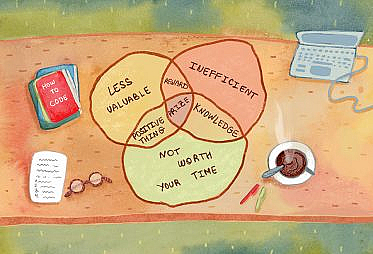Many professionals wonder how to stand out in the data job market when competition is so high. To stand out, candidates need more than just technical skills—they need a strategic approach, strong soft skills, and a clear understanding of what employers are looking for in today’s hiring landscape.
As an analytics engineering director who has interviewed and hired ICs and managers, I think there’s several specific, yet simple, actions a job applicant can do to increase their chances of winning an interview or job offer. Plenty of other people think so too, and that’s why Locally Optimistic hosted a panel with individuals who have either hired for data roles or started new data jobs in the last year. Our panel shared key tips and insights for data professionals navigating the job market, which we’ve distilled into this article.1 Many thanks to our panelists Brian Toole, Andie DeLeon, Nicklas Ankarstad, and Taylor Styduhar!
1. Standing Out in a Saturated Market
With so many applicants for each data role, tailoring your resume and leveraging your network are key strategies for how to stand out in the data job market. Here’s how to make your application stand out:
Leverage Your Network Strategically
Networking is essential. It’s also a fun way to just meet and learn from people! Reach out to former colleagues or industry contacts, especially those who may work at companies you’re interested in. This doesn’t mean cold messaging everyone at a company. Instead, identify a relevant contact, like someone in a similar role or team, and send a personalized, genuine message. Focus on building rapport by expressing interest in their role or the industry the company operates in. Networking isn’t just about job opportunities; it’s a chance to meet interesting people, share knowledge, and learn from others in your field. You’re playing the long game by nurturing relationships which may turn into future job referrals.
If you’re reaching out to a hiring manager or recruiter about a specific role, do so after you’ve already applied through official channels first. Expressing enthusiasm about a particular company or role after you’ve followed the standard application process shows respect for the hiring protocol and indicates genuine interest. Do personalize your message to them; hiring managers and recruiters are spammed constantly and will easily spot generic, mass-message content.
Remember, networking can be an ongoing activity and not just something to turn to during a job search. By consistently investing in your network, you’ll be better prepared when you need it and can avoid the cold-start problem many people face when they suddenly begin reaching out.
Engage in Industry Thought Leadership
One way to make your profile stand out is by participating in industry or community discussions. This can be as lightweight as chiming in on a Slack, LinkedIn, or Bluesky thread with some insightful comments, which allows others to start getting to know you. Looking for something bigger? Consider writing blog posts on LinkedIn, contributing articles to industry websites, or speaking at data meetups. For instance, Locally Optimistic welcomes guest blog posts from data professionals of all levels. Sharing your expertise on technical projects or industry insights not only builds credibility but also expands your brand and network.
Customize Your Resume for Each Role
A tailored resume is key to making it past the initial screening. Use the job posting as a guide, emphasizing relevant skills, tools, and experiences that align directly with the company’s needs. For example, if the job requires “marketing analytics” experience, make sure you showcase similar work or relevant skills. It’s more work, but it can help boost your resume in Applicant Tracking Systems (ATS) and improve your chances of being noticed by recruiters. Try to timebox this to 20 minutes per job post. If you’re taking longer, it might be a sign that you’re overthinking it! And the more frequently you customize your resume, the faster you’ll get at it each time.
Follow Application Instructions
Finally, always follow the official application process. Many companies use Applicant Tracking Systems (ATS) like Greenhouse, Ashby, or Lever to manage applicants, so applying directly through a company’s career page or LinkedIn listing is essential. Skipping this step, even if you know someone at the company, can cause issues down the line and may even disqualify you from consideration.
2. Mastering Technical and Soft Skill Assessments
Interviews for data roles often involve both technical and soft skill assessments, each requiring its own preparation.
Approaching Technical Assessments
Technical assessments vary widely across companies! Some will opt for coding exercises completed during interviews, while others assign take-home projects where you explore a dataset and showcase your work by submitting SQL scripts or presenting business findings and recommendations. Remember that employers are primarily interested in seeing how you think through an ambiguous problem, structure your approach, and work within constraints. Just your flawless, bug-free code won’t impress them.
Employers value candidates who showcase problem-solving skills. This is one of the most effective ways for how to stand out in the data job market. Be ready to articulate your thought process clearly via in-code comments or additional documentation, highlighting decisions you made, definitions you’ve outlined, and steps you might do differently given more time or different priorities. All this helps interviewers assess your analytical thinking and decision-making styles.
Showcase Soft Skills and Communication Abilities
Today’s remote and hybrid work environments demand strong, proactive communication skills. Data teams need people who will over-index on effective communication across multiple platforms and in multiple channels. They’ll be expected to independently explain analytical insights to stakeholders and proactively take charge of situations where data reports or pipelines are failing and multiple teams are impacted.
During interviews, focus on both your technical and interpersonal skills. Demonstrating confidence in your ability to work independently and proactively communicate with others shows hiring managers that you can thrive in their environment. This can be as simple as explaining technical projects clearly, showing how you ask for and handle feedback from your peers, or describing how you approach cross-functional projects.
3. Show Your Work!
In technical interviews and assessments, the importance of honesty and transparency cannot be overstated. Here are two key things to keep in mind to present yourself authentically and effectively:
Realistically Estimate Your Skills
Overrating your skills—claiming expertise when you’re still learning—is a common misstep. Employers in technical fields value self-awareness. If you rate yourself a “10 out of 10” in SQL but struggle with advanced questions in an interview, it undermines your credibility. Even if you are a true 10/10, overconfidence can be off-putting. Instead, be transparent about your strengths and areas for improvement. If you’re at an intermediate level with a language or tool, state it confidently. Even better, express your level in terms of specific skills, not an ambiguous level. “I’m very comfortable writing queries with multiple CTEs, complex joins, and window functions” tells your hiring manager more than a numeric or leveled rating. This helps hiring managers accurately assess your abilities and could lead to opportunities for training and growth in areas where you’re still developing.
Reveal Your Thinking Process
Honesty is essential during the interview process. If you use tools like ChatGPT or other AI resources to prepare for an assessment, be transparent about it if asked. Integrity is a valued trait, especially in roles that involve handling sensitive data or client information. If there’s a technical problem you’re unfamiliar with, it’s often better to say, “I’m not sure, but here’s how I’d approach it” rather than attempting to bluff your way through. This demonstrates problem-solving skills and shows a willingness to learn.
4. Breaking into Specialized or Niche Roles
If you’re aiming to transition into a new specialization—like moving from public sector consulting to marketing analytics—it’s important to position your background as an asset. Here’s how to do it:
Focus on Transferable Skills
When applying to specialized roles without direct experience, highlight the skills that translate across fields. For instance, if you’re transitioning into marketing analytics from consulting, emphasize your client presentation skills, problem-solving in complex environments, or experience in translating data insights for different audiences. These skills are valuable in pretty much any context. If you’re switching from a government-focused background, frame your experience to highlight how it equips you to understand high-stakes environments, manage complex datasets, or work effectively within regulatory constraints. The key is to link your experience directly to the needs of the role and showcase how your background uniquely prepares you to add value.
Showcase Adaptability and a Commitment to Growth
Employers value adaptability and a commitment to learning, especially in entry-level roles. Highlight examples of times you learned a new tool or language, which can show that you’re able to pick up new skills quickly. Consider adding a section to your resume or LinkedIn profile to spotlight recent courses, certifications, or self-driven projects. Demonstrating your dedication to growth helps you stand out especially in an industry where hiring managers and potential teammates are constantly adapting to new tools and methods.
Finding Success in the Job Market
The data job market demands adaptability and persistence. By focusing on networking, tailoring your applications to each role, and demonstrating humility, transparency, and integrity in interviews, you can significantly increase your chances of standing out. Mastering both technical and soft skills will help you succeed and show employers that you know how to stand out in the data job market. Remember, continuous learning is just as critical as technical expertise—keep refining both, and you’ll be ready when the right opportunity comes your way.
- How? I took the auto-generated transcript of the YouTube recording, ran it through ChatGPT 4o (prompt: “Produce a 1,000-word summary of this transcript of a panel talk about the data job market, with clear and specific insights, but don’t write about the panel itself or the speakers themselves.” I edited all parts of the output and collected feedback from other Locally Optimistic members to create this published draft. ↩︎





